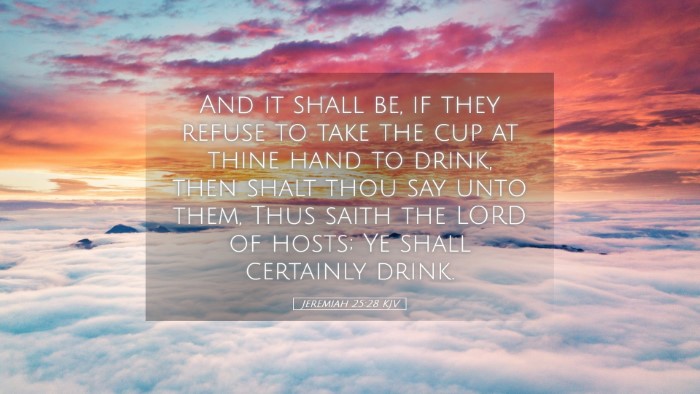Bible Commentary on Jeremiah 25:28
Verse Overview: Jeremiah 25:28 states: “But if they do not listen to you, they will perish by the sword; they will die from the disease and famine I will bring upon them.” This verse encapsulates the call for obedience to God's word and the dire consequences that result from disobedience. It serves as a vital reminder of the seriousness with which God regards His covenant and the prophetic warnings delivered by His messengers.
Context and Background
The Book of Jeremiah, often termed the 'weeping prophet,' is replete with warnings and lamentations regarding Judah's impending doom due to their persistent disobedience. Jeremiah prophesied during a tumultuous period when Jerusalem faced imminent threats from Babylon. The context of Jeremiah 25 is crucial as it depicts God's righteous judgment coming upon a defiant nation.
Historical Context
During Jeremiah’s time, the kingdom of Judah was entrenched in idolatry and moral decay. The prophet was called to confront this apostasy, emphasizing repentance. Chapter 25 focuses on a prophecy of judgment, underscoring the necessity of heeding the voice of the prophet. As noted by Matthew Henry, the Lord was exceedingly patient, but His patience had limits; hence, He urged them to listen.
Commentary Insights
Warnings Against Disobedience
Albert Barnes elaborates on the nature of the warnings. The designation of a “sword” represents not only literal warfare but also the overarching theme of divine retribution. When God’s people turn from Him, He often permits calamities to awaken a sense of urgency towards repentance.
- Spiritual Implications: The “sword” symbolizes death which can be both physical and spiritual. Adam Clarke asserts that the consequences are not limited to earthly demise but extend into eternal separation from God for those who continue in rebellion.
- God's Justice: God's judgment is a significant theme in Jeremiah’s writing. Clarke comments on how God employs various means—sword, disease, famine—as instruments of His justice to bring back a wayward people.
The Role of the Prophet
Jeremiah was tasked with proclaiming this dire message, and his role is critical. As reflected in Henry's commentary, prophets often faced resistance and rejection. The call to warn the people shows God’s mercy in desiring their return to righteousness. Jeremiah’s insistence on their heedfulness indicates an opportunity for repentance.
The Consequences of Ignoring God's Voice
Listening to God’s messengers is paramount. The dire proclamations in this verse suggest that neglecting these warnings leads to catastrophic results. In the commentary by Matthew Henry, he highlights the futility of ignoring God’s instructions. The road to destruction often begins with a refusal to listen.
Theological Reflections
This passage prompts theological reflection on the nature of God as a judge and the relationship between divine sovereignty and human responsibility. The consequences outlined underscore the significant weight placed upon prophetic words and divine commandments.
- The Nature of God: God’s judgments are not arbitrary; they reflect His character as just and holy. He desires obedience, not out of arbitrary authority, but out of a genuine longing for a relationship with His creation.
- Human Responsibility: This verse serves as a reminder to modern believers of their responsibility to heed biblical teachings and warnings. Ignoring divine direction often leads to personal and communal desolation.
Application for Today
Jeremiah 25:28 speaks profoundly to contemporary issues within the church and society at large. The warnings against disobedience are timeless, urging a vigilant response to divine instruction.
For Pastors and Church Leaders
For pastors, this verse serves as a clarion call to preach faithfully and without fear. Providing clear biblical teaching can prevent congregants from straying into perilous paths. It is essential to maintain a prophetic voice within the church that aligns with Scripture.
For Students and Theologians
Theological inquiry should involve the examination of God’s attributes as displayed in judgment and mercy. Students can explore the balance of God’s justice and love, critically assessing how the Church today addresses sin and calls for repentance.
For Individual Believers
The individual believer is called to introspection. Are we diligent in our hearing and adherence to God’s word? Personal application of the teachings in Jeremiah can lead one toward a profound understanding of obedience and the consequences of spiritual negligence.
Conclusion
Jeremiah 25:28 serves as a pivotal reminder of the importance of heeding God's warnings through His prophets. As illustrated by the commentaries of Matthew Henry, Albert Barnes, and Adam Clarke, the significance of listening and responding to divine instruction resonates throughout the ages. The lessons gleaned underscore a critical truth: that obedience to God's word is not only protective but also means engaging in a vibrant relationship with the Creator.


